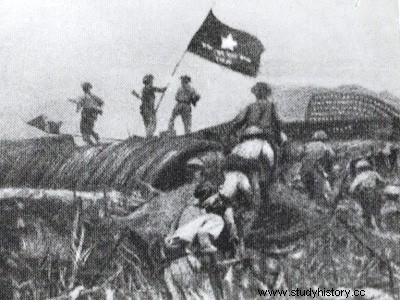
The night of March 30, after heavy artillery preparation and the explosion of a mine under "Eliane", the 312th and 316th Div. attacked the five hills which constituted the positions of “Dominique” and “Eliane”. The fight that followed lasted four days, during which there followed, in an uninterrupted way, attacks and counter-attacks. On April 2, the 308th Div. attacked "Huguette", and Bigeard launched a counter-attack which drove out the Viet-minh with the loss of 800 men. Another attack recaptured a strongpoint of "Eliane", but although the morale of the garrison remained at a high level, the positions were not improved.
Giap had suffered very heavy casualties, but he was pursuing a well-defined political goal in launching his near-suicidal attacks against the French lines. Diên Biên Phû had become the object of world interest and, in Geneva, the conference on Korea of Indochina had included the debate on Indochina on the program of May 8. If Giap managed to crush Diên Biên Phû before that date, the Viet Minh negotiators at the conference would find themselves in an extremely favorable position.
The end is near
On May 1 at 10:00 p.m., the Viet Minh launched a general offensive. The French had no more than three days of food and barely 275 rounds of 155 mm, 14,000 of 105 mm and 5,000 of 120 mm for mortars. The assaults were directed against the remains of “Claudine” and “Dominique” as well as against the twin hills of “Eliane”. On May 6, Giap engaged his Katyushas—for a few moments the French thought the sound of the vehicles on which the multi-tube rocket launchers were mounted was that of the arrival of a relief column. By dawn on May 7, the base had been reduced to a quadrilateral of about 800 m side. During these last hours, Bigeard still managed to mount a counter-attack with the help of the last tank, commanded by Captain Hervouët who, for the occasion, had removed the casts that held his fractured arms.
After 55 days of siege, Diên Biên Phû fell fighting, but did not surrender. Only 3,000 men survived out of a total of 16,544. More than 3,000 men had fallen in combat and another 10,000 perished, either during the marches to the prison camps or during the period of "re-education" that followed. . The Viet Minh lost 8,000 dead and 15,000 wounded, but Giap was able to present a victory to his political negotiators in Geneva.
